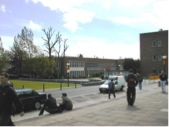Return to the search form Return to your search results
Iowa Regents in Wales: Swansea University
Fast Facts
Sessions Offered:
Fall, Spring, Academic year
Location:
Swansea, Wales, United Kingdom
Credit:
Resident
Eligibility:
• Clear interest and commitment
• Demonstrated preparedness and maturity
• Minimum 3.0 GPA
• Good academic and disciplinary standing
• Sophomore, junior, or senior standing at the time the program begins
• Approval by UI Study Abroad
• Acceptance by host institution
• Attendance at orientation sessions
Application Due:
• September 24 for Spring
• February 24 for Fall and Academic Year
Program Cost:
Check the 'Costs' section under the Application tab.

This semester or academic year program offers undergraduates the opportunity to enroll in a wide range of courses in a variety of disciplines at Swansea University in Swansea, Wales. Students are fully integrated academically and socially with their Welsh peers.
Before you get started, take a looks at the Exchange and Visiting Student page on the Swansea University website, take a tour of Swansea, and learn more about the study abroad experience at Swansea University.
Academic Program

Courses
Students enroll with their local Welsh peers in regular classes at Swansea University. Students earn 12-18 s.h. for each semester at Swansea.
While enrolled at Swansea, students can choose from courses from a huge variety of disciplines. You can find details about the courses offered at Swansea University under the Course Catalogue and Credit Load heading on their Fact Sheet page.
Course Restrictions
Before registering for your classes at Swansea, it is important that you review the information under the Course Catalogue and Credit Load heading on Swansea's Fact Sheet page.
Specific courses must be approved in advance to receive major, minor, or certificate credit, or to satisfy the University of Iowa’s General Education Requirements.
Fall Semester: Extended Exam Period and Alternative Assessments
Fall Semester Students: Please note that fall semester students who take courses through the Biological Sciences, Business, Computer Science, Economics, Engineering, Geography, and Mathematics departments will need to remain in Swansea through the exam period until late January. It is not possible for students who take courses in these departments to take their exams early, and so they must remain in Swansea through the exam period.
Fall semester students who take courses in other departments may be able to work with the department’s office after arrival to Swansea to make arrangements to take their exams before the regular exam period. In this case, students may be able to end the semester in mid-December, before the usual exam period.
In either case, all Fall semester students should be prepared to remain in Swansea until the end of the fall exam period in late January. See the Dates section below for detailed information on program dates.
Credits at Swansea
The number of ‘credits’ each course provides is different that the number of UI semester hours you will receive when your transcript from Swansea arrives at the University of Iowa. See below for details about how Swansea’s credits are ‘translated’ into UI semester hours:
- 10 credits at Swansea is equivalent to 3 semester hours at the University of Iowa
- 15 credits at Swansea is equivalent to 4 semester hours at the University of Iowa
- 20 credits at Swansea is equivalent to 6 semester hours at the University of Iowa
- 30 credits at Swansea is equivalent to 8 semester hours at the University of Iowa
Flexibility Regarding Course Offerings
Foreign universities are typically unable to provide a final course catalog for the upcoming semester until shortly before the semester begins. Students usually do not know which specific classes they can take before arriving abroad, and they usually do not register for classes until they arrive in their host country- this means that there is no way to guarantee that you will be able to enroll in your preferred courses. Your final course schedule may not be finalized until you are already abroad and attending classes.
Because of these differences, all students must meet with their academic advisor before going abroad to discuss how the differences in course availability will affect their degree progress and graduation plans. It is important to develop a back-up plan in case your preferred courses are not available when you arrive at their host university.
Transcripts

Swansea sends Fall semester transcripts are sent to University of Iowa by the end of February.
Swansea sends Spring semester/Academic Year transcripts to the University of Iowa by the end of July.
Students can expect their grades to be applied to their UI grade reports within 2-3 months after they arrive to the University of Iowa.
Resident Credit
All courses available at Swansea University are approved for UI resident credit.
A Note on Grading
Students who participate in the Iowa Regents' Semester in Wales program will receive regular US letter grades for the courses they take at Swansea University. These grades will apply to their University of Iowa GPA in the same way that classes taken on the UI campus would.
Applying credit toward a UI degree
Unless UI Study Abroad has an approval on file for the courses you take abroad to be applied toward a specific major, minor, certificate, or general education requirement, you will receive general elective credit for your course.
If you plan to apply the credit you receive for your program course to a major, minor, certificate, or general education requirement, contact your UI study abroad advisor for details on the process.
Program Dates
Program dates vary from year to year, but typically follow the University of Iowa’s academic calendar.
You can find detailed dates for the upcoming sessions on Swansea's Arrival Details website.
Students should consider these dates tentative until they receive final dates for their session abroad from the host university prior to the start of the program.
Arrival Date
Plan to arrive in at your host university the day before official program activities begin. For example, if the program orientation starts on September 3, plan to arrive on September 2. Be sure to review the Travel Arrangements section for more information before purchasing your plane tickets.
For more information
Steps to Studying Abroad
- Before initiating an application for this program, students must complete a Discover Study Abroad session at the University of Iowa.
- After completing the Discover Abroad session, students will receive an email with their study abroad advisor assignment.
- Once assigned, students must meet with their study abroad advisor to receive program application instructions.
Study Abroad
1111 University Capitol Centre
Iowa City, IA 52242
Phone: 319-335-0353
Email: study-abroad@uiowa.edu
Where You Will Study

Swansea University is attended by about 18,000 students. The university is known for its friendly and welcoming atmosphere. Students come from all parts of the UK—England, Scotland, Northern Ireland, and Wales—as well as many other countries. In fact, 20% of students are international students, so the campus enjoys an international flavor along with unique Welsh cultural influences.
The University has an attractive campus, situated in acres of park land right on the coast of Swansea Bay. Faculty-student relationships are excellent and students are encouraged to take an active part in departmental life. The Taliesin Arts Center, Sports Centre, and University Students' Union (which runs over 100 societies and clubs) offer a wide array of leisure activities.
Swansea
Swansea is a modern port city of 239,000 inhabitants. It enjoys excellent road and rail connections to all parts of Britain. London, Stratfod-upon-Avon, and Oxford are all only three hours away by train. The city is both an important commercial center and a growing tourist destination.
Facilities include excellent shopping centers—the city's market dates back to the Middle Ages, yet the Quandrant Shopping Center next door is one of the most modern in the country. Dozens of shops are housed in attractive undercover malls and arcades. Swansea's splendid Maritime Quarter has been the role model for other national Maritime developments.
The Grand Theater is among the most important in the UK and attracts major touring companies, opera, and international entertainers. Swansea hosts an international festival of music each October which attracts world-famous artists, orchestras, classical performers. Swansea also has several cinemas, numerous restaurants offering cuisine from around the world, a major art gallery, and two museums. First-class rugby, cricket, and soccer are played in the city.

Swansea University lies on the wide sweep of Swansea Bay with the Gower Peninsula, an area of outstanding natural beauty, extending fifteen miles to its west. The Gower consists of a string of secluded and dramatic bays, cliffs, valleys, and sandy coves. It is a natural playground for hiking, horseback riding, hang gliding, surfing, fishing, and rock climbing. And, if you keep a sharp eye out, you might seen the odd puffin or seal splashing around!
United Kingdom
The United Kingdom (UK) refers to the four countries of England, Scotland, Wales, and Northern Ireland. This is in contrast to another common name, Great Britain, which excludes Northern Ireland. Each part of the UK has a distinct culture and history. Experiencing these rich traditions is what studying in the UK is all about!
Cultural Resources

- Swansea University on Facebook
- Swansea University’s International Office on Facebook
- Swansea University’s YouTube Channel
- An introduction to Swansea from the International office at Swansea University
- Swansea University on Instagram
- City of Swansea website
- Wales’ official tourism page on Instagram
- Swansea University website
- Swansea University Study Abroad Office
- Students' Union (clubs, societies, travel, etc.)
- UK’s official tourism page on Instagram
US Department of State Country Information
The US Department of State provides safety and security information for every country of the world to help you assess for yourself the risks of travel. Each country information page contains a Travel Advisory, Alerts, and other important details specific to that country that could affect you.
Pay close attention to the entry and exit requirements, local laws and customs, health conditions, and other details to help decide whether traveling to any given country is right for you. Non-US citizen travelers may also wish to seek guidance from the embassy of their country of citizenship. The UI International Travel Policy for Students addresses restrictions on student travel to high-risk locations and engagement in high-risk activities abroad.
Living Arrangements/Accommodations

Students make their accommodation arrangements prior to arrival in Swansea. All accommodations are in apartment-style residence halls with a combination of local and international students. Private rooms with shared kitchen and bath facilities are the norm. Each residence hall offers similar amenities, but is located in a different part of the city. You can learn more about the housing options at Swansea on their Accommodation website.
University of Iowa students are required to stay in housing arranged through the host university. Iowa students cannot stay in privately arranged housing. Housing costs will be paid directly to your host institution. You will receive details about how to pay for your housing abroad from your host institution prior to departure. You should plan to pay a housing deposit early in the semester prior to your departure. Estimated housing costs are provided under the Application tab above. All students need a valid passport to participate in this program. If you do not have a passport, it is important that you apply for one as soon as possible to ensure you receive it before the program begins. US citizens can find more information about how to apply for a passport on the US Department of State’s website.Housing Costs and Deposits
Passport
US citizens can find more information about how to renew a passport on the US Department of State’s website.
Students with a valid passport should check the expiration date. Passports must be valid for at least 6 months AFTER the anticipated return to the US from studying abroad. If your passport is not valid for at least 6 months after your anticipated date of return to the US, you must renew your passport before applying for the visa you will need to enter your host country.
Expedited processing service is available for US passports (although this still takes several weeks and is at an additional cost). UI Study Abroad encourages students to ask the passport agency at the time of application whether expedited service is recommended.
Non-US Citizens
Students who are not US citizens should contact their consulate for more information if they need to get a new passport or renew their passport.
Travel Arrangements (Flights)

Purchasing Plane Tickets
UI Study Abroad will not arrange a group flight to your study abroad destination. You will purchase plane tickets to your host country on your own, though UI Study Abroad can assist by providing advice regarding airline booking options.
You are advised not to purchase your plane tickets until:
- You have received an official offer of acceptance from your host university, and have submitted confirmation materials to UI Study Abroad.
- You have finalized your housing arrangements abroad.
- You are aware of 1) the semester start date (including orientation programing) and 2) the move-in date for your accommodations abroad.
- You have received your visa (if required- contact your study abroad advisor for more information).
If you are studying abroad during the fall semester or for the academic year, plan to purchase your plane tickets by June or July. If you are studying abroad during the spring semester, plan to purchase your plane tickets by early November.
Arrival PlansPlan to arrive in your host country as early as possible the day before official program activities begin. To ensure that you meet your host country's immigration requirements and that you are covered by international health/travel insurance, do not arrive in your host country sooner than one day before the official start of program activities.
If you have questions about purchasing plane tickets, or would like to coordinate your travel with other UI students, please contact your UI study abroad advisor.
Local Transportation
Swansea has an excellent public transportation system, though many students navigate the main areas of the city on foot or by bike. You can find more information about public transportation options in Swansea on their Public Transport website. Taxis are available throughout the city. Swansea is also well connected to the rest of the UK by bus and train. Two major airports are located near to Swansea, connecting you to the rest of Europe within a few hours.
Eligibility

This program is open to University of Iowa students who fulfill the following requirements:
- Good academic and disciplinary standing- Students must be in good academic and disciplinary standing at the University of Iowa. Students placed on either academic or disciplinary probation for any period of time overlapping with the study abroad program dates are ineligible to study abroad on a University of Iowa program. Academic and disciplinary history will also be considered when determining whether a student is prepared to represent the University of Iowa as part of this program. Students who are not in good standing at any point overlapping with the program dates will have their acceptance revoked, and will be responsible for the associated late withdrawal fees.
- Minimum 3.0 UI and Transfer GPA- Students must have a minimum 3.0 UI and Transfer GPA to participate in this program (transfer GPAs lower than 3.0 may be considered on a case-by-case basis).
- Sophomore, junior, or senior standing required- Students must have sophomore, junior, or senior standing at the time the program begins. First year students cannot participate in this program.
- Approval by UI study abroad advisor- A student’s application must be reviewed and approved by their University of Iowa study abroad advisor.
- Acceptance by host institution- Students must be accepted by their host institution as a temporary visiting student. Acceptance by the host institution is typically automatic for students that have been nominated by their study abroad advisor, but the final acceptance decision is made by the international student office and the sponsoring departments at the host institution based on their own internal requirements.
- Attendance at mandatory orientation programming- Students must attend all in-person and online pre-departure orientation programming presented by UI Study Abroad.
- Clear interest and commitment- Students must demonstrate a clear academic or personal interest in the program’s subject matter, and a commitment to engage responsibly in coursework abroad.
- Demonstrated preparedness and maturity- Students must demonstrate preparedness to take on the heightened responsibilities associated with international study and travel. Students must demonstrate a commitment to behave responsibly abroad while respecting cultural differences. Students are expected to obey both local laws and program directives conveyed to participants before and during the program. The University of Iowa Code of Student Life applies to all program participants while abroad.
Ongoing Industrial Action in the U.K.
Universities in the U.K. have recently been impacted by ongoing indistrial action. U.K. exchange/direct enrollment program applicants must understand the very real possibility of cancelled classes, independent study adaptations and/or delayed grading.
Applicants without a high degree of flexibility regarding course availability, class cancellations, and delayed grading should consider postponing an application until the situation resolves, or choose to apply to a different program.
Costs
Students will be responsible for paying many of their program costs through their University of Iowa U-Bill, while other costs will be out-of-pocket costs paid by the student directly to vendors before and after going abroad. Refer to the cost sheets below for details on the costs associated with this program.
The cost sheets outline the total estimated costs associated with participating in this program and can be used for financial aid purposes. They include fees charged on students’ U-Bill as well as out-of-pocket expenses. Actual out-of-pocket expenses will vary from individual to individual. Quoted estimates are conservatively high, yet realistic.
Costs for future sessions are usually similar to the current session, however students can expect a modest increase in overall costs each session. Final cost sheets for future sessions are typically available early in the semester before the session begins.
Cost Sheets
 Cost Sheet- Iowa Regents Semester in Wales- Spring 2023
Cost Sheet- Iowa Regents Semester in Wales- Spring 2023
Calculating Fees
The cost sheets are based on the fees described below:
- University of Iowa Study Abroad Administrative Fees
- University of Iowa’s CISI health insurance
- Program course fees, housing, flight, and other costs of attendance.
Cost sheets do not include the following optional costs:

Personal Travel Costs
Costs for personal travel are not included in the cost estimates provided on the cost sheet. If you plan to travel outside of your host city or country during or after your study abroad program, you will need to budget for additional funds to cover the cost of your personal travel.
The cost of personal travel depends entirely on each student’s individual travel plans and spending habits. Estimates for personal travel costs provided by past students on this program vary significantly from $1,500 to as much as $9,000 or more per session.
Costs charged to the U-Bill
- Application fee (charged at the time of application, before financial aid/scholarships disburse)
- Course Fees- Includes host university tuition (charged shortly before departure)
- Study Abroad Fees (charged shortly before departure)
- CISI Health Insurance (charged shortly before departure)
Out-of-pocket costs (not charged to U-Bill)
- Round trip airfare from Cedar Rapids (paid by student directly to travel agent or airline- approx. 6-8 weeks prior to departure, before financial aid/scholarships are disbursed)
- Food (paid by student at their discretion while abroad)
- Housing (charged upon arrival to the UK )
- Housing deposit paid by student shortly before departure to the UK , before financial aid/scholarships are disbursed)
- Visa fees (paid by student upon or shortly before arrival to the UK , before financial aid/scholarships are disbursed. See the Immigration/Visa section under the Predeparture tab for more information.)
- Immigration Health Surcharge (paid by student on arrival to the UK - only required for academic year students)
- Local transportation- (paid at student’s discretion while abroad)
- Cell phone (paid as needed while abroad)
- Passport (paid by student prior to departure, before financial aid/scholarships are disbursed)
- Textbooks (paid as needed while abroad)
- Medical exam/immunizations (paid by student as needed prior to departure, before financial aid/scholarships disburse)
- Personal expenses and personal travel (paid by student at their discretion while abroad)
Scholarships & Financial Aid
You can find information about options for funding your study abroad experience, including financial aid, scholarships, grants, etc., on UI Study Abroad’s Finances page.
How to Apply
This is a two-part process. You apply first with the University of Iowa. If approved, you will submit a separate application to the host university abroad.
- Meet with the appropriate study abroad advisor to discuss your study abroad plans well ahead of the application deadline. Your application will not be approved until you've completed this step. You can set up an appointment by calling UI Study Abroad at 319-335-0353 or through the Advising Appointment section of your MyUI account.
- Meet with your academic advisor(s) to discuss how this program might fit your graduation plans, and make a back-up plan in case your preferred courses are not available when you arrive on your host university’s campus (see the Flexibility Regarding Course Offerings section for more information.)
- If you and your academic advisor agree that the program is a good match for you, complete the UI Study Abroad application. Please note that the non-refundable $50 application fee will be charged to your U-Bill as part of this online application.
- If you meet the requirements for the program and there are sufficient spaces available, you will be nominated to study at the host university by UI Study Abroad.
- Once nominated, you will receive details about how to complete the visiting student application for the host university abroad. Your application will be reviewed by the host university, and they will contact you with your final acceptance decision.
- Academic Year and Fall semester students can expect to receive their final acceptance decision from the host university by early summer, and Spring semester students can expect to receive their final acceptance decision from the host university by late November.
Post-Acceptance
Confirmation
If you are accepted to your program, you will be asked to commit to participating in your program by submitting the University of Iowa Confirmation of Participation form, as well as completing requirements for your host university.
After you have formally confirmed your plans to participate, you will work both with UI Study Abroad and your host university. Follow instructions from both. Later in the semester, your UI study abroad advisor will contact you regarding orientation sessions, registration, and other required UI procedures and documentation.
Application Deadline

Applications for the Fall and Academic Year sessions are due on February 24.
Applications for the Spring session are due on September 24.
Health & Safety Planning
Students should carefully review the following materials starting at least two months prior to departure:Iowa Regents CISI Health Insurance Information
Immigration/Visa
All program participants are required to complete immigration requirements to enter and study in your host country. UI Study Abroad and your program provider/host institution abroad will provide you with immigration instructions prior to departure.
Note that permission to enter and study in your host country is provided exclusively by the host country’s government based on that country's immigration requirements. Your host country’s immigration requirements may include considerations related to specific national origin, national heritage, criminal background status, and similar issues that can make it impossible to receive permission to enter the country in some cases. Contact your UI study abroad advisor for more information.
It is essential that you thoroughly review all of your immigration materials before you leave for your host country to ensure that they are absolutely complete and accurate. It is entirely your responsibility to ensure that all of your immigration materials are in order and fully accurate before you leave for your host country. If any of your immigration materials contain inaccurate information of any kind, contact your UI study abroad advisor immediately to discuss your options.
Do not take steps to complete your host country’s immigration requirements until you receive more information from UI Study Abroad.
Review the UI Study Abroad Travel Documentation website for further guidance on the immigration/visa process.
Orientation
In order to prepare for your time abroad, you are required by the University of Iowa to complete two orientations. These may be in addition to orientations provided by your on-site provider. See below for more information.
Online Education Abroad Pre-Departure Orientation
You are required to complete the International Programs ICON course "Education Abroad Pre-Departure Orientation" prior to departure. This orientation is mandatory for all students going abroad under the auspices of the University of Iowa. It covers many practical matters about living overseas, such as health and safety, communication, money, goals, and much more. You will be enrolled in this course by International Programs and an email will be sent to you once enrolled. If you have any questions, you can email safety-abroad@uiowa.edu.
Program-Specific Orientation
This orientation will be facilitated by your UI study abroad advisor and will cover content specific to your program and host country. It could be conducted in a group setting or one-on-one depending on your type of planned activity abroad. Your study abroad advisor will send you more information about this mandatory in-person session.
1111 University Capitol Centre
The University of Iowa
Iowa City, Iowa 52242-1802
USA
Phone: (319) 335-0353
Fax: (319) 335-0343
E-mail: study-abroad@uiowa.edu
